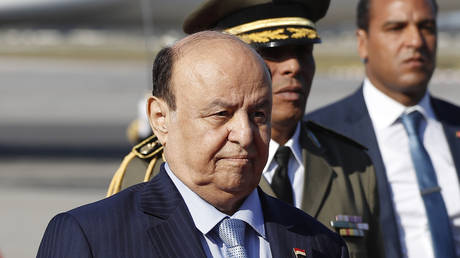
The former leader now lives under tight restrictions in Riyadh, officials in Saudi Arabia and Yemen reportedly said
Yemen’s former president Abdrabbuh Mansur Hadi has reportedly been confined to house arrest in the Saudi capital of Riyadh following an agreement to remove him from power earlier this month.
Speaking to the Wall Street Journal under the condition of anonymity, Saudi and Yemeni officials said Saudi leadership pressured Hadi to step down before he ultimately handed power to a council of Yemeni factions on April 7, and has largely forced him to remain at a home in Saudi Arabia since.
“Hadi is effectively under house arrest at his residence in Riyadh without access to phones,” one Saudi official told the Journal, while another noted that a few Yemeni politicians had been allowed to see him, but only with the government’s permission.
Abdullah al-Alimi – the director of the Yemeni president’s office, who now serves as vice president of the new leadership council – challenged the ‘house arrest’ characterization, but said it would take time to arrange a call with Hadi, suggesting some level of restrictions on his communications.
Some Saudi officials also reportedly threatened to “publicize what they said was evidence of corruption allegedly committed by Mr. Hadi” in order to compel his resignation, the Journal added, but went on to cite another anonymous official who pushed back against this charge.
“Saudi Arabia has not orchestrated the removal of Hadi nor threatened to expose alleged corruption,” they said. “Its role was limited to conveying the desire of the Yemeni factions who participated together in the Yemeni-Yemeni talks to President Hadi.”
Hadi’s resignation followed more than seven years of brutal conflict in Yemen, during which a coalition of states led by Saudi Arabia and heavily supported by the United States waged a relentless bombing campaign, helping to drive what the UN has deemed the world’s most dire humanitarian crisis. The 76-year-old was elected on a one-man ballot in 2012, but was forced to flee the Yemeni capital in 2015 amid an uprising by Houthi rebels, who have since held onto power.
The warring parties recently agreed to a two-month ceasefire, which coincided with Hadi’s removal from office, with UN officials voicing hopes the truce could bring an end to fighting that has devastated civilian infrastructure across Yemen, including farms, factories, hospitals, schools, roads, bridges and ancient cultural sites. Some 400,000 people have been killed to date, including in fighting and airstrikes, as well as through deprivation caused by the war.




